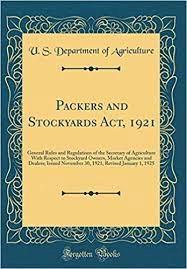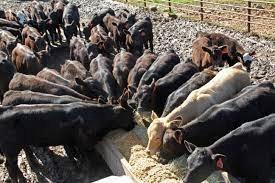 Attorneys General of a number of agricultural states have urged USDA Secretary Tom Vilsack to intensify enforcement of the Packers’ and Stockyards Act 0f 1921.
Attorneys General of a number of agricultural states have urged USDA Secretary Tom Vilsack to intensify enforcement of the Packers’ and Stockyards Act 0f 1921.
The Attorneys General maintain that consolidation especially in the beef industry has weakened the bargaining position of beef ranchers and hog producers. The letter stated "this consolidation makes it more difficult for producers to get the best prices for their products, forcing many smaller cattle, hog and chicken farms out of the market".

With regard to broilers, their contention is incorrect since the major integrators own their flocks and provide chicks and feed to contract growers. These independent farmers house and care for flocks during the growing cycle and are paid for the use of their facilities, labor and utilities. The broiler contract system absolves the independent contractor from fluctuations in the market and input costs and ensures regular income as each flock is harvested. The Packers’ and Stockyards Act protects contract growers with regard to accuracy of weight and prevents any manipulation of he basis of payment.
With regard to beef, the Attorneys General encouraged interagency collaboration of government departments and sharing of information with regard to markets. The letter urged the USDA to monitor the relationship between packers and suppliers. The Attorneys General suggested investment in new competitive entrants into meat and poultry processing adding strength to existing small and very small facilities.
 Financial support of small operations would be an unfair use of government funds and would ultimately support inefficiency at the expense of shareholders in existing packing companies. The Attorneys General are obviously interested in exercising existing antitrust legislation for political ends. The letter proposes that the USDA and DOJ investigate ways in which large packers can be dismembered such as occurred with AT&T. This company served as a virtual landline monopoly in the 1970's until enforced breakup occurred in January 1982 after eight years of litigation. Prior to the AT&T breakup, the previous exercise of the Sherman Antitrust Act of 1890 took place in 1911 following the successful lawsuit brought against Standard Oil by the U.S. government.
Financial support of small operations would be an unfair use of government funds and would ultimately support inefficiency at the expense of shareholders in existing packing companies. The Attorneys General are obviously interested in exercising existing antitrust legislation for political ends. The letter proposes that the USDA and DOJ investigate ways in which large packers can be dismembered such as occurred with AT&T. This company served as a virtual landline monopoly in the 1970's until enforced breakup occurred in January 1982 after eight years of litigation. Prior to the AT&T breakup, the previous exercise of the Sherman Antitrust Act of 1890 took place in 1911 following the successful lawsuit brought against Standard Oil by the U.S. government.
History is the witness to the fact that when governments attempt to intervene and regulate industries, unintended consequences hurt shareholders and consumers with the major benefit, if any, accruing to politicians and bureaucrats.